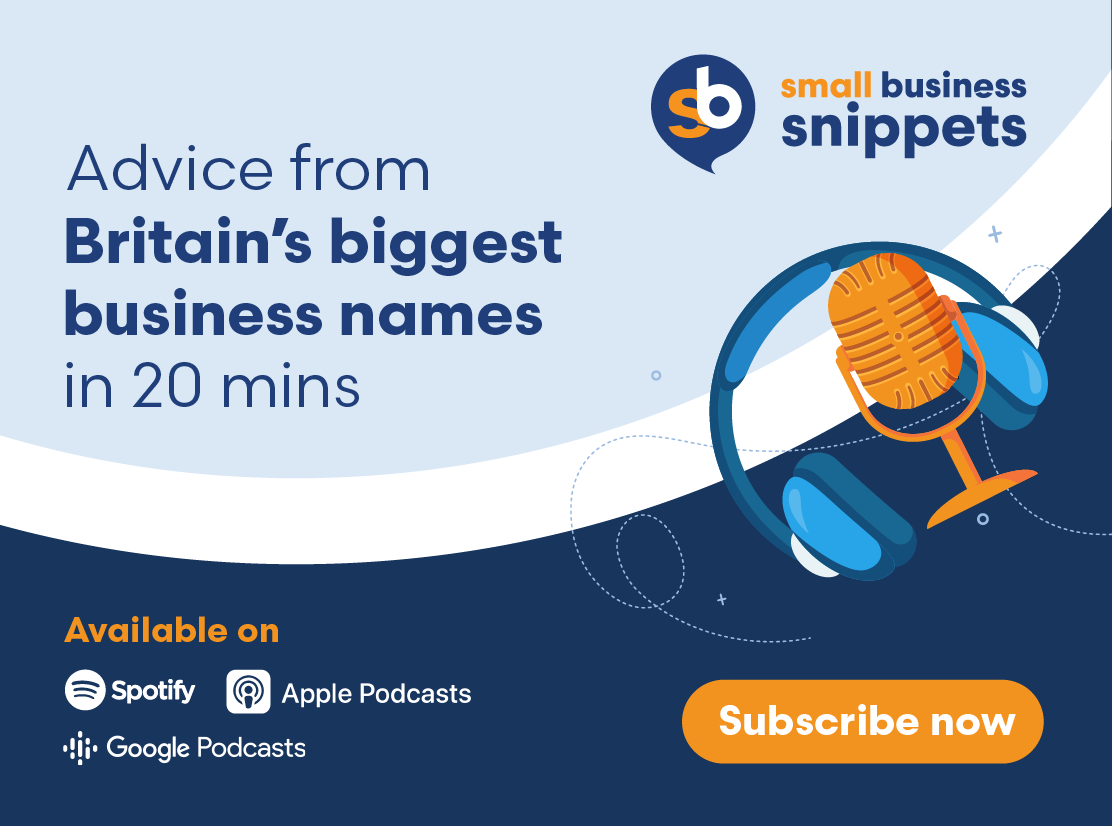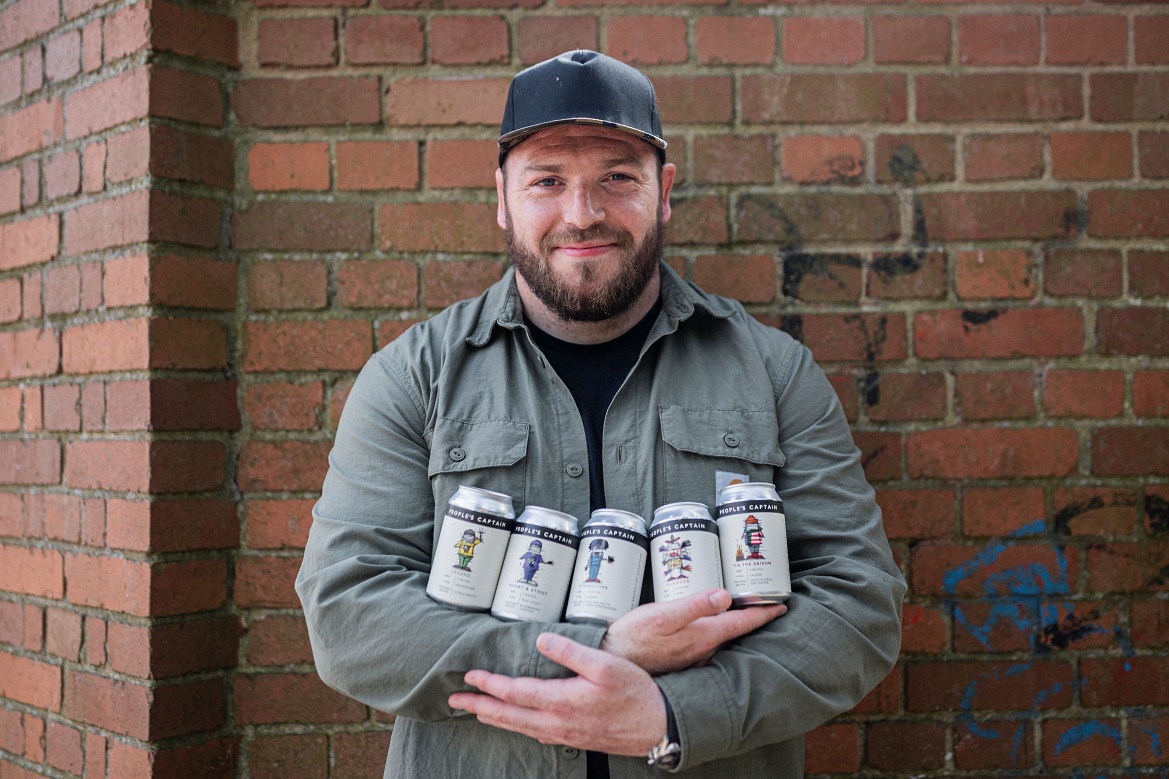Welcome to the second series of Small Business Snippets, the podcast from SmallBusiness.co.uk. Today’s episode features Sherry Coutu, a serial entrepreneur, angel investor and one of the leading names in the UK digital sector.
We talk about tips for investment pitches, time management and difficulties in the tech sector.
Have a listen to it in the media player below.
You can also catch our episodes with:
- Entrepreneur and former Dragon, Rachel Elnaugh
- Businesswoman and Dragon, Deborah Meaden
- Entrepreneur and The Apprentice 2005 candidate, Tim Campbell
- Gousto CEO, Timo Boldt
- Entrepreneur and The Apprentice 2018 candidate, Jackie Fast
- Investor and former Dragon, Piers Linney
- Investment fund manager, Nicola Horlick
- Supermodel turned entrepreneur, Caprice
We’ve got podcast episodes from the first series looking at:
- How one business owner’s mental breakdown caused her to see trolls from her past
- How one entrepreneur hired a videographer to track their every move and build their business brand
- How funding a business led one entrepreneur to stress-related alopecia
- One entrepreneur’s first professional public speaking engagement
- Adapting to UK life and learning English before starting a business
- Securing seed funding
- Finding the perfect head of customer care
- Reaching a £1 million annual rate of return
- Boosting client numbers from 30 to 850
- Starting a brand new business from scratch
To find out more about Small Business Snippets, you can download the trailer.
If you want to listen to the podcast elsewhere, it’s available on iTunes, Google Play, SoundCloud and Spotify. It’d also be great if you could leave us a review and subscribe.
Remember to like us on Facebook @SmallBusinessExperts and follow us on Twitter @smallbusinessuk, all lower case.
Want to read Sherry Coutu’s podcast interview instead?
Please note that this podcast was recorded before COVID-19 became prevalent in the UK.
Hello and welcome to Small Business Snippets, the podcast from SmallBusiness.co.uk. I’m your host, Anna Jordan.
Today we have Sherry Coutu, a serial entrepreneur, investor and advisor. She’s also on the board of Founders4Schools, Workfinder, Raspberry Pi, the Department of Culture Media and Sport (DCMS), Pearson and the London Stock Exchange.
We’ll be discussing the most common slip-ups that businesses make when pitching to investors and the most pressing issues in the digital sector.
Anna: Hello, Sherry.
Sherry: Hello.
Anna: It’s lovely to meet you. How are you doing?
Sherry: Yeah, I’m very well, thank you. Good to see you.
Great. OK, I’d like to start off by going back to the beginning. As the intro suggests, your background is in digital and tech. You were a developer and programmer before you became an entrepreneur and an angel investor. What was it like being a female developer at the time you started out?
Sherry: Well, I’ve never been a male developer. I think I came to it thinking it wasn’t that unusual being a female developer. I had studied at EF International and some other women had gone into digital when I was at the London School of Economics studying so it didn’t seem that unusual. I’d joined a large consulting company and that large consulting company had a number of women in that intake and we were all programming. It didn’t seem that abnormal to me. I was doing things that I thought were interesting and I was learning skills that I didn’t find that difficult and that I enjoyed, so it was pretty easy by and large. I didn’t know at the time how unusual what I was doing was or would be seen afterwards.
When did that become apparent?
Sherry: I don’t know. Again, I don’t approach things on a gender basis. I saw other people that I liked who were doing work that I enjoyed, and we had projects which were interesting. When did it become apparent? You do sort of notice that you’re often the only woman in the room, and it was probably afterwards that I thought, ‘Oh, that’s odd. It’s no longer 50/50 – it’s a lot less than that’. It didn’t bother me that much – I was pretty absorbed in what I was doing. It was really interesting work.
It’s a good way to look at it and some women thrive on that kind of atmosphere as well. It’s a similar situation for investors. What were the most common pitching mistakes you saw from businesses pitching to you?
Sherry: Well, I think there are a couple – I was thinking about your question earlier. And I think there’s a couple of common issues. One is not researching. I’m a member of the Cambridge Angels and have been members of HBS Angels as well. And if an investor comes to you and they haven’t researched who they’re in the room with, that is really common blooper, and it’s not a sensible one.
I think if I had advice for them, it’s to research who you’re pitching to and know what’s in their portfolio and to know what they’ve what they’ve done before. I think, having somebody explain to me something that, clearly, if they’d looked at my background, they would understand that I knew. It’s a waste of their time, whereas you can get into more detailed things right away otherwise.
The other issue, something that is unforgivable to me as an investor is not understanding who your customer is. Or demonstrating your keenness to delight that customer. A lack of focus on that is really annoying to me.
I think the only reason we are given opportunities as entrepreneurs is because we can delight customers and create things that will help them in their life in a multitude of ways. And I think a lack of customer focus is annoying to me. And it’s usually makes for a fairly short meeting. And it definitely means that I won’t follow up because, it’s like, well, why are you doing this? The first question I’m often asking is why are you trying to solve this problem? Who are your customers? What does this do for them?
Yeah, exactly. So, encouraging better work experience at school is a key focus for you especially just now, what kind of barriers do you think that small employers face when taking on work experience pupils?
Sherry: Work experience for people in school and in university is something that I’m really keen on. I don’t think of it as barriers. I think all small businesses have projects that they need to get done. You can ask a full-time permanent employee who’s already working full tilt to do a project, or you can think, ‘Are there ways that I can get other people from outside my company that might have a fresh view, who I don’t have to offer a permanent job to, to get this project?’
To me, the biggest issue there is as a small business person is finding people to do those extra projects that I really would like to do for my customers. Maybe it’s so that I can be more obsessed with my customers and get them more focusing on a new product development or customers in a new country or in a new city. But I think that current students at university, supplemented possibly by students doing their A Levels, are a great way of getting projects done quickly and efficiently. And hey, you might even be able to hire the student who is doing the work for you afterwards.
But we all have projects, we’ve all got dozens of projects. Maybe it’s sitting down and thinking of which of the projects I have that would be suitable for five students doing a month or five students doing a couple of weeks, breaking it down into something that can be accomplished that will be meaningful to me as a business.
Taking it back to the start, for an employer that has never done work experience before, has never offered a kind of programme of sorts –
Sherry: They don’t need a programme. They’ve got projects all the time. And we all have projects. I think there are big company ways of approaching work experience and there are small company ways of approaching work experience.
The big company ways tend to be structured programmes that happen in June or July. And they might be quite cumbersome on the company. What I’ve seen work brilliantly for small companies, small and medium sized companies and start-ups and scale-ups are joining project teams, or all working on a project that the employer wants to get done that can’t get done any other way.
And that means that for the supervision of that project, you’ve got four people on it, but you put together the brief that might take you a tiny bit of time, or you could use Workfinder, we’ve got more than 100 briefs that are appropriate to ask students at university. You could take one of our briefs of, well, you might be thinking about this, here’s how you do this type of project.
You brief them on the first day, you touch base with them for half an hour just to make sure that they’re going along the right path for the length of the project, and then you get them to present the project view at the end. I think it’s great. And then you use it, because it’s a project that will help you do something more for your customers that you haven’t been able to do, because everybody’s really busy. I mean, we always are pressed for time in small businesses and large businesses.
Yeah, absolutely. What’s the kind of state of things at the moment in terms of small businesses taking on work experiences? Is it quite common? Or could it be done more widely?
Sherry: Well, I would love it to happen more widely. But it happens more often in start-ups and scale-ups than it does in large companies. We published this at the Gallup Institute earlier this year, that it was it was more likely that they had taken on students both at university and at school to do those extra projects in small and medium-sized companies.
For me, I’ve got endless projects. I’d rather have a constant stream of people.
And I think the other one of the other barriers is that large companies tend to do it in the summer, but when we spoke to small and medium sized companies, they had projects all year round, and they didn’t want to be constrained to having to do it in July or something like that. With lots of other small companies that we work with, it worked fine around it Founders4Schools fitted in through throughout the year so that it works better with them.
Anna: I suppose they have the advantage as well because They don’t have the processes and the departments to go through that larger businesses do.
Sherry: Yeah, exactly. And they may not and they’ll have urgent projects that pop up, maybe it’s a pitch, maybe it’s a pitch for a customer and what you need is somebody to ask, ‘Well, can you do a bunch of customer research for me?’ We don’t know these people, use Google, use LinkedIn. Yeah, help me put together this pitch. But there’s lots of really good projects that help people who are at school and university understand what work experience is. It’s deeply meaningful to the company, it also gives them a proper sense of what it would be like to work for that company.
But it’s risk-free because maybe it’s a week, maybe it’s two weeks, maybe it’s a month and they can choose, they get the project done, they decide if they love it, or they hate it. If they love it, they can keep on talking if they don’t love it, they can try different project and a different type of company and see if they like that industry better.
Actually, as lately pertains to your expertise and for companies in the digital sector, and they’re experiencing a lot of upheaval at the moment – politically, financially in so many different ways. What would you say are the most prominent issues affecting the digital sector right now?
Sherry: Well, most recently GDPR was a change. I think was a change for the good because it protected consumers and customers and made sure that all companies were being mindful of whose data it was that they had the privilege of being a custodian of. So, I think I think there’s that.
In the UK, I’m not going to say that word [Brexit], but it’s been harder. It’s been harder to retain people from Europe for reasons that are outside of our control, and that’s tricky. Attracting people who have the right skill set is also really difficult because there’s been a sequencing issue with small companies, we create lots of jobs, but they are jobs in agile management and data science.
Schools and universities aren’t yet churning out people who have those skills. And I think solving that issue so that we small digital companies don’t suffer from a skill shortage any longer is certainly very much on my mind. And I hope to make some contribution to that agenda.
Anna: It feeds back into the work experience as well, doesn’t it? You teach them as early as possible and let them know what opportunities are out there.
Sherry: Yeah. And I think it’s understanding that you’re not going to have the same job for 30 years, and actually, that really sounds quite boring anyway. Let’s sort of just assume that we need the framework for working here on this type of project for this type of company for a period of time and then we’ll move on and we’ll do something else.
The needs of the customers will change. And our needs as we go through our own lifetime change as well. Often we’ll work full time, we might work very flexibly when we’re having children. And then once they’re off at university, we might go back up to full-time or, like me, choose a portfolio of things, which is like having a bunch of part-time jobs, all of which I love.
But I love the flexibility of this. If you listen to LinkedIn, the average person now has 25 jobs between graduation and retirement, seven different identifiable career streams. What’s your next career stream? I mean, it’s kind of neat when you think about it that way.
What would you say to small business owners who maybe have trouble establishing what skills their workforce needs, and maybe the resources well, to provide them?
Sherry: Well, I think there are some great online resources. For staff I use LinkedIn Learning quite a lot. For coding skills, there’s Coursera, there’s Udacity, there’s Futurelearn, there’s a lot of free online courses that allow us to upskill our staff.
I think we all need to be learning all of the time. If we don’t invest in ourselves as the leader of a small business and we don’t invest in our staff then well, it might be harder to retain people, it might also be harder to fulfill those customer orders because they’ll be asking us for stuff that we don’t know how to do.
I think I a commitment to continued learning and allowing and encouraging creativity in ourselves and in the people that work for us as a culture of learning is really important.
Actually, now that we’re touching on it. You fit a lot into your days and obviously, there’s the continual upskilling as well. What kind of time management tips do you have for our listeners who may be struggling and a bit stretched?
Sherry: I’m sure anybody who knows me doesn’t necessarily think that I’m great at managing my time. But I try to. I think if you’re a portfolio, it’s quite helpful because you compartmentalise things and you’re context switching. That keeps you fresh. It also keeps you managing quite closely. Something that I have used for a long time is trying to be at home 20 out of 30 nights, especially when the kids were at home and younger, being at home 20 to 30 nights a month. And if you’ve got that rule that you will be at home by 6pm or earlier if you can, that allows you to show the commitment that you have to your family and to yourself.
I try to exercise as much as I should. I’m not sure I think probably in the last month, I have definitely broken my rule. But I’ve got I’ve got training set up in January, February and March and it’s scheduled into my diary. I try to schedule things.
I do try to review on a weekly and a monthly basis. Am I content with how I’m spending my time? And when I went to the rule of 20 or 30 nights at home by 6pm, I found that because there’s so many interesting things going on all the time. And I wanted to do everything I literally did find myself out every night. And then you think, ‘My God, I haven’t really seen my children. I haven’t spent any time with my husband, and I don’t feel good about that.’ And so I just sort of put a hard and fast rule and it’s like, nope, this is how I’m going to do it from now and it works.
Are you working when you’re home at 6pm? Or is that a cut-off point when you stop working?
Sherry: I’ll stop working. Not necessarily for the day – I might go in and back on it between 10pm and 11pm and just sort of plan out the next day. I do tend to be crazily busy. Even if it’s just planning out what you’re supposed to wear, because you’ve got this little jingle jangle of meetings and you think, ‘Good Lord, what’s going to navigate through that set of meetings of that day, what am I going to wear?’ Just sort of thinking about the how you’re going to execute the next day, if it tends to be mixed up. I don’t ever go to an office and sit at a desk.
I think, ‘I’m going to be home with family. I’m not going to have my phone on, I’m going to focus,’ and that gives them the right message. And it also gives me the release that you need as a person from work.
Do you rely more on people or tech to sort of help you organise your schedule?
Sherry: Both. For the tech, I use calendar Google Calendar. I’m not making an advertisement for Google. But I think many small businesses use it rather than some of the more traditional ones. And if I’m meeting someone, I asked them to append in what the agenda is and what the papers are. My call forward file is not a physical call forward file that say, it’s literally in the description of that. And I find that really helpful as I prepare for the meetings, I find the ability to invite people to meetings from within your diary. And then if you move it, they all get notified and you don’t have to do all of that is really helpful.
I do have an executive assistant (EA) who I adore and she’s kind of a magician, because I tend to want to do too many things than might actually be possible, and she makes it a lot more possible than it might otherwise be. I do depend on her and enjoy the fact that she helps and is very au fait with and good at using technology as well, which is helpful to me.
If you’re a small business owner and you could have an entourage of sorts, what kind of people would you hire in terms of, say, a PA or an accountant?
Sherry: Well, I would certainly use LinkedIn very aggressively. I probably am on LinkedIn two hours a day as I prepare for meetings as I research the people that I want to pitch these sorts of things are the people that I’m about to speak to. I think it’s really important to use tools that are there. An accountant? Yes, you definitely need accountants. I think in small businesses, there are great part time accountants that you can that you can have. And I’m a real fan of those because you don’t necessarily need a full-time one. And there’s a lot of particularly women returners to work who have been full-time finance directors and they’re there with kids and they want to work on a part-time basis. And I think they are a godsend to many, many, many small businesses.
Anna: Seems to work for everybody, right?
Sherry: Yeah, absolutely. You may be a small company of ten people, you might need someone who’s doing finance a couple days a week well, you need somebody who’s a returner, returning to work for that. And on PA I don’t know if everybody needs me know, there’s lots of people that I know that work in large tech companies that no longer have PAs there’s many people who have the whole senior management team has a sort of shares in EA or a PA, I think many people and in fact, it’s been shown that 65 per cent of those jobs have already disappeared because people are using technologies more aggressively.
If you look at the research on what jobs are disappearing, sadly, PAs and EAS are definitely far less prevalent than they were five years ago, but I couldn’t be without LinkedIn. I also use a service called Accompany which will sort of harvest your diary and then it’ll give you notes about the backgrounds of the people that you’re meeting the day before. And if you don’t use it, you should use it because it’s amazing. I find those I find those really, really helpful.
Well, I realise you’re busy lady, so I’ll wrap up by coming back to your expertise as an investor. You were an early investor in firms like LoveFilm and Zoopla saw for new tech companies looking to pitch what would you be looking for in their pitch?
Sherry: Well, for me, solving a problem that matters is the most important thing.
I’m particularly interested in the future of work. It’s been a real interest for 20 years that the skills crisis is getting worse. And I am interested in working with others to fix that problem, which I think is the number one problem that we have. I’m also very interested in the application of AI and ML in the sphere of health. And I think that, just around the corner, there are some great solutions to really irksome terrible problems of a health nature, that technology will help us solve. And people who are determined to solve those problems using technology will help themselves, so I’m particularly interested in those two areas.
Some people shy away from them because they’re complicated, and some people shy away from them because they’re highly regulated. They’re really important – the health of our citizens is really important, as is the ability to have the right skills so you can prosper and make a contribution to your community.
I’m not that interested in hearing people pitch me on things other than those two sort of, they’re fairly broad subjects. But those are those that what I’m really interested in and can be an active in what they call smart money, rather than just dumb money. I’m interested and can probably help in some ways as well.
The health and wellness industry is massive. What would you say to entrepreneurs who are put off by a large amount of competition in the in the sphere?
Sherry: Create a fantastic product that your customers love. That’s way better than anything else, that they’re either getting the way that, you know, 40 per cent of our GDP is controlled by companies that didn’t exist five years ago. Think about that. What competition? There are really big issues that are absolutely unsolved. And we entrepreneurs, and the people who find entrepreneurs are the only ones who are going to solve it on the time on, on the timeframe that we’ve got available to us. So, I’d say, solve them. Do it.
Anna: Fabulous. Well, that seems like a good place to wrap up. Thank you very much for coming on podcast.
Sherry: My pleasure. Thanks very much for having me and good luck with everything.
Anna: You can find out more about Sherry at uk.linkedin.com/in/coutu. You can also visit smallbusiness.co.uk for more on raising capital and managing your time. Remember to like us on Facebook @SmallBusinessExperts and follow us on Twitter @smallbusinessuk, all lower case. Until next time, thank you for listening.





